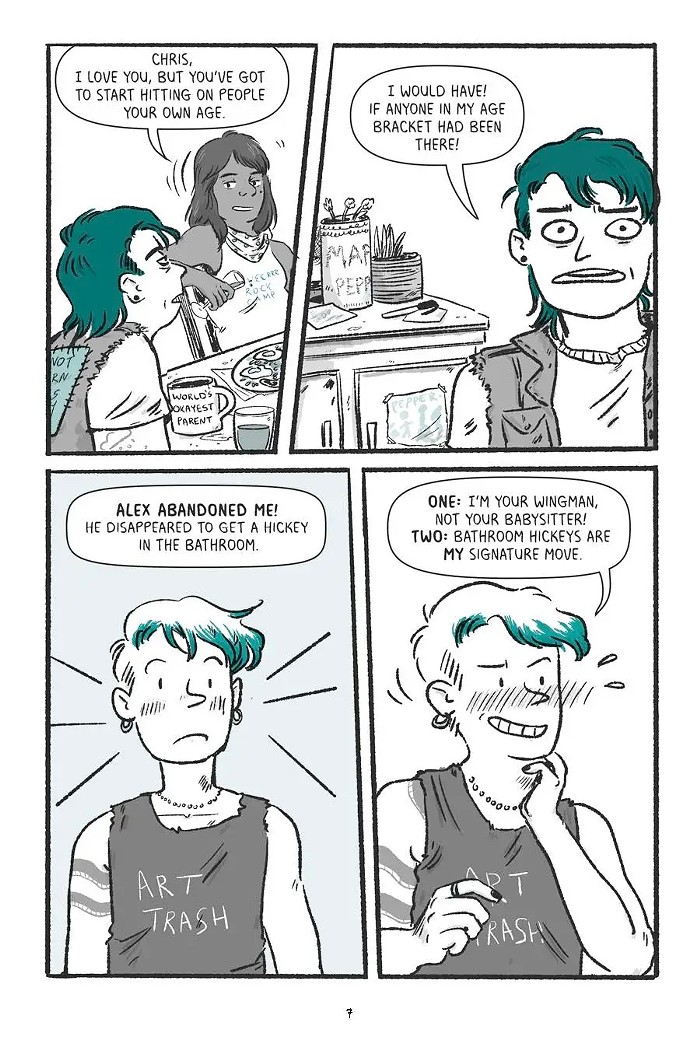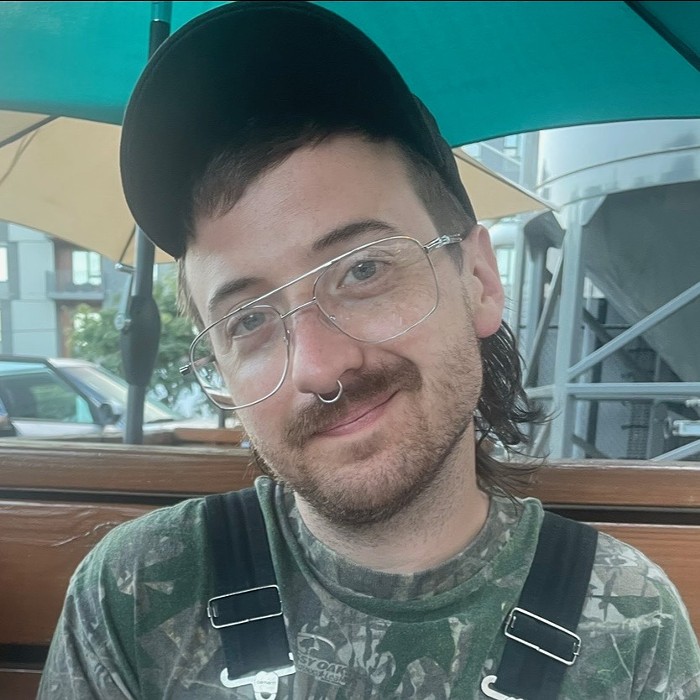The story starts with a problem as old as time (or at least the '70s): A broken Hitachi.
“Damn! That’s the third one this year!” a wide-eyed Elise complains to her three friends at brunch. “Did I read a book? No. Did I catch up on work? No. I rewatched Butches in Chains five times until my Magic Wand bit the dust.”
So begins Mimosa, the first full-length graphic novel from comic artist and Minneapolitan Archie Bongiovanni. You might know them from their Quick and Easy Guide to They/Them Pronouns, or The Stonewall Riots: Making a Stand for LGBTQ Rights, but while their nonfiction projects helped get their name out there, fiction has always been nearest and dearest to their heart.
“I one thousand percent prefer fiction,” Bongiovanni told the Mercury. “I get to create not just the characters, but the spaces they’re in, their universe, their friends… There’s so much creativity behind it, which I find really freeing and exciting to work on.”
Bongiovanni’s stories tend to revolve around the often hilarious, always messy intricacies of queer friendship. They found their groove telling these stories with a monthly serialized comic Grease Bats, published by the feminist website Autostraddle. The series, which started back in 2013, follows a group of friends navigating regular, day-to-day struggles—relationships, work, and, when 2020 hit, the trials and tribulations of COVID isolation. It was well-received, but eventually, Bongiovanni set their sights on a longer-form project.
“I wanted to do an original graphic novel,” they said. “I was ready to do something more in-depth.”
In 2020, Bongiovanni brought what they’d been working on to Portland’s own Tin House, where they worked on the new book under the mentorship of Mira Jacob, author of Good Talk, who was leading a graphic narrative course as a part of the publisher’s Summer Workshop program.
“When it comes to books, comics are still frequently seen as a less-than storytelling medium,” Bongiovanni explained. “What’s so cool about Tin House is that they treat comics like a worthwhile medium—one that’s deserving of critique and revision. That doesn’t exist in a lot of other literature spaces.”
By the end of the year, Bongiovanni had lined up a contract with Surely Books: A line of graphic novels curated by This One Summer author Mariko Tamaki, aimed at publishing LGBTQIA+ creators and content.

Mimosa follows a close knit group of four best friends—Elise, Chris, Jo, and Alex—living in a fictionalized version of Minneapolis (which could easily be mistaken for Portland), where they regularly meet to spill tea, connect over brunch and, you guessed it, mimosas. Distraught by the fact that they’ve suddenly become the oldest ones at the queer parties in town, they decide to throw a soirée of their own, specifically for “homos over 30.” In the process, the once-unbreakable four-way friendship, in Bongiovanni's own words, “implodes.”
The story is, in many ways, a spiritual sequel to Grease Bats. It’s about queer love, chosen family, how we all fuck up sometimes, and how hard it can be to mend things afterward. But whereas the conflict in Grease Bats often revolved around distinctly mid-twenties-feeling problems, the struggles in Mimosa feel more grownup—new parenthood, office romance, and class inequality, to name a few. It was an intentional evolution by Bongiovanni.
“I wanted to make sure the characters I was writing and drawing about aged with me,” they said. “I see parts of myself in all of them.”
While it’s clear that Bongiovanni has grown up right alongside their characters, that doesn’t mean Mimosa is exactly autobiographical—though they did once help organize a queer dance night in Minneapolis, and are in no hurry to do so again. Rather, they drew inspiration from things they’ve witnessed in the community around them, from the experiences of friends to conversations overheard at bars. As a result, the characters feel profoundly relatable (e.g. Jo responds to a Chris complaining in the group chat with, “Your stress is SO valid,” before rolling her eyes and tossing the phone aside).
The normalcy—sometimes even mundanity—of everyday woes in Mimosa’s truly lovable (if imperfect) cast of characters is exactly the point Bongiovanni had in mind.
“It’s an important story to tell, because it features queer characters just living their lives,” Bongiovanni said. “The LGBTQ young adult market is thriving right now, and it’s about time! But simultaneously, not many publishing houses are putting the same amount of energy or marketing into books about queer adults. I think it’s important that we see our lives as they are—as interesting and vital at any age.”
Archie Bongiovanni will be part of a group book reading and Q&A with comics journalist (and full disclosure, former Mercury reporter) Sarah Shay Mirk at Powells, 1005 W Burnside, on Sat, April 8, 2 pm, FREE.
They will also be reading as part of Comics Club at Taborspace, 5441 SE Belmont, Fri, April 7, 7 pm, FREE.
At both events, the subject matter may contain mature themes.














